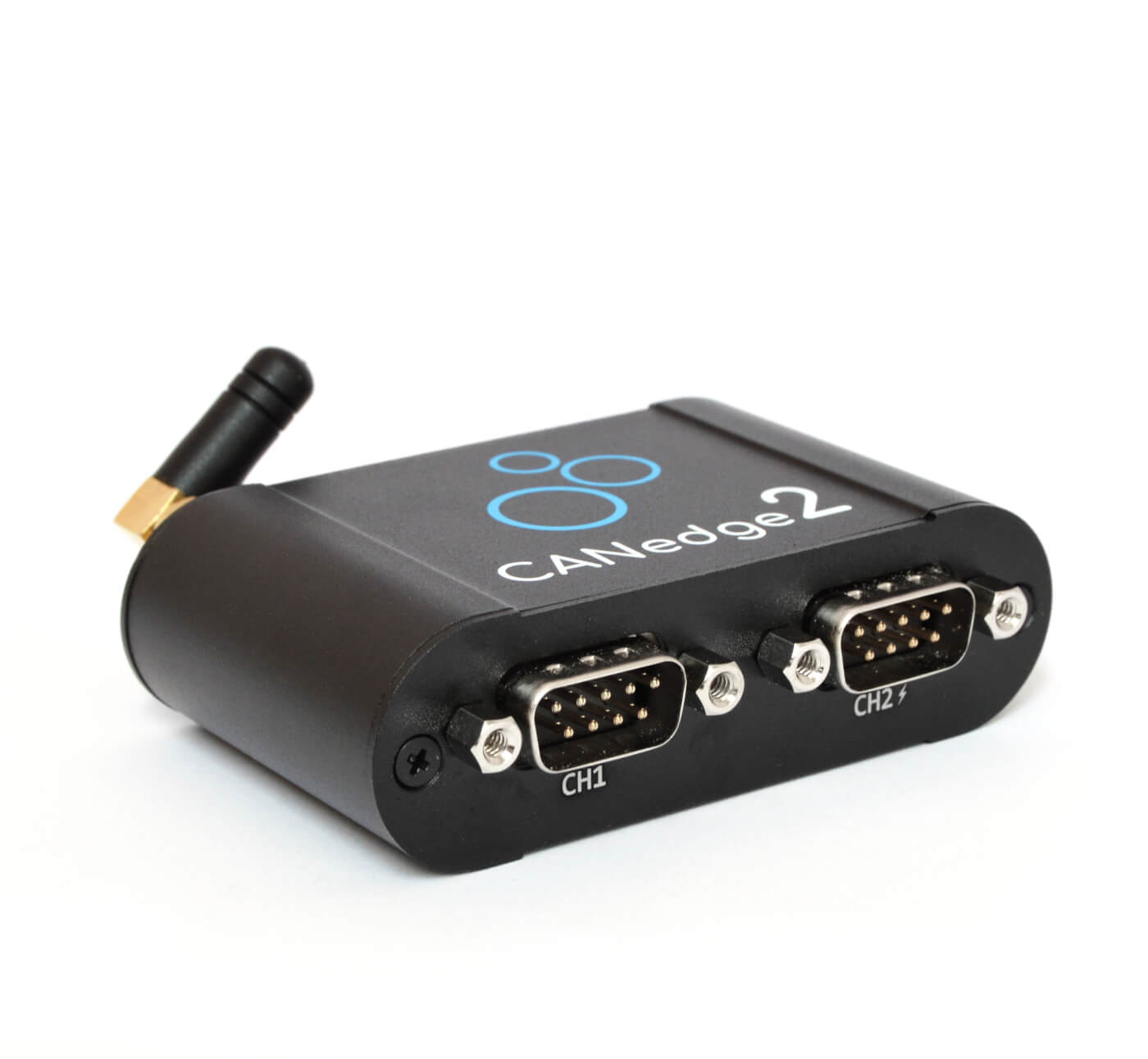Der Plug & Play 2xCAN/LIN Logger zeichnet zeitgestempelte CAN-Daten (klassisch/CAN FD) auf die ausziehbare 8GB (optional 32GB) Industrie-SD-Karte auf.
Das kleine Gerät verbindet sich über WiFi-Zugangspunkte (z.B. WLAN oder 3G/4G-Router), um Daten sicher zu Ihrem Server zu pushen. Darüber hinaus kann das Gerät over-the-air aktualisiert werden.
Ideal für Telematik, F&E-Feldtests, Diagnose und vorbeugende Wartung.
Software/APIs sind frei und quelloffen - ohne Abonnementgebühren oder Herstellerbindung.
Features
- Plug&Play - Loggen Sie Daten sofort nach dem Auspacken. Standalone - kein PC erforderlich. Stromversorgung über CAN-Anschluss
- Besonderheiten - Extrahierbare 8-32 GB SD. 2xCAN/LIN. CANFD. Kein Datenverlust. 50 µs RTC-Auflösung. MDF4
- So klein - Nur 8 x 5 x 2 CM. 100G. Gehäuse aus Aluminium. 4 LEDs. Konfigurierbarer 5V-Ausgang (CH2)
- Konfigurierbar - Erweiterte Filter. Übertragen von Listen. Trigger. Zyklische Protokollierung. Ruhe-Modus.
- Schnell & Sicher - Industrielle SD-Karte. Daten mit 80 MB/s lesen. Datenverschlüsselung für GDPR/CCPA
- Open-Source-Software- Freie Open-Source-Software/API-Werkzeuge. Konvertieren von Daten in z.B. CSV, ASC, TRC. DBC-Konvertierung & Plotten
Technische Details
Allgemeine Details
- Funktionalität: Standalone-Datenlogger mit SD-Karte und 2xCAN/LIN-Kanälen (inkl. CAN FD)
- Firmware: Unterstützt kostenlose Firmware-Updates zum Hinzufügen von Funktionen
- Konfiguration Konfigurationsdateien auf der Grundlage des beliebten Open-Source-JSON-Schemakonzepts
- Software: Kostenloses Open-Source-Editor-Tool zur einfachen Gerätekonfiguration (Offline-/Online-Version verfügbar) & Kostenlose Open-Source-Software asammdf & API zum Bearbeiten, DBC-Konvertieren & Plotten von MDF4-Daten & Kostenlose Open-Source-C++-MDF4-Konverter - Drag & Drop von Protokolldateien zur Konvertierung in z.B. CSV, ASC, PCAP
- Sicherheit: CE-, FCC-, IC- und RoHS-zertifiziert & Geprüft auf Spannungstransienten (Emissionen/Störfestigkeit), ISO 7637-2:2011, durch TÜV SÜD (siehe Handbuch)
Informationen zum CAN-Bus
- Kanäle: 2 x CAN/CAN FD-Kanäle
- Standards: Norm ISO 11898: Entspricht CAN (bis zu 1 Mbit/s) und ISO & Bosch CAN FD (bis zu 5 Mbit/s)
- Protokolle: Protokollierung von Rohdaten aus CAN-basierten Protokollen (J1939, FMS, CANopen, NMEA 2000, OBD2, ...)
- Identifier: die den CAN-Spezifikationen 2.0A (11-Bit-ID) und 2.0B (29-Bit-ID) entsprechen
- Bit-Rate Auto-Detect: Bit-Rate kann automatisch erkannt oder manuell eingestellt werden
- Neuübertragung: Konfigurierbare Neuübertragung von Frames, die die Arbitrierung verloren haben oder durch Fehler gestört wurden
- Transceiver-Schutz: ±16 kV HBM ESD, ±15 kV IEC ESD, ±70 V Busfehler, Kurzschluss & Gleichtakt-Eingangsspannung: ±30 V & TXD-Dominanz-Timeout (verhindert Netzwerk-Blockierung im Falle eines Ausfalls)
Informationen zum LIN-Bus
- Kanäle: 2 x LIN-Kanäle (Slaves)
- Standardkonform: mit LIN 2.0 bis zu 20 Kbit/s ("erweitertes" Prüfsummenformat)
- Transceiver-Schutz: ±8 kV HBM ESD, ±1,5 kV CDM, ±58 V Busfehler & TXD-Dominanz-Timeout (verhindert Netzwerk-Blockierung im Falle eines Ausfalls)
Informationen zum Datenlogin
- SD-Karte: 8 GB ausziehbare industrielle Mikro-SD der Klasse 10 (SDHC) enthalten (optional 32 GB) - Lesen mit 80 MB/s i
- Parallel CAN/LIN: Daten von bis zu 2 x CAN-Kanälen + 2 x LIN-Kanälen gleichzeitig aufzeichnen
- Echtzeituhr: Ja - CAN-Frames werden mit Datums- und Zeitstempeln mit einer Auflösung von 50 Mikrosekunden versehen & Die RTC kann so konfiguriert werden, dass sie den lokalen Zeitzonen entspricht (Standard: UTC)
- Protokolldateiformat: Protokolldaten im Industriestandard-Binär-MDF4 (einfache Konvertierung in z.B. CSV, ASC, Pandas, MATLAB, ...)
- Datenkomprimierung: Konfigurierbares Komprimieren eingebetteter Protokolldateien (~50-80% Größenreduzierung)
- Stiller Modus: Konfigurierbarer stiller Modus: Eingeschränkt (nur Bestätigung) oder Überwachung (keine Übertragung)
- Filter:128/64 reguläre/erweiterte ID-Filter pro Kanal (Bereich, Maske, Annahme, Ablehnung, Vorskalierung)
- Übertragen Übertragen: Übertragungslisten von CAN-Frames pro Kanal (single-shot/periodisch) - z.B. für OBD2-Anforderungen
- Zyklische Protokollierung: Optionaler zyklischer Protokollierungsmodus (die älteste Protokolldatei wird gelöscht, wenn die SD-Karte voll ist)
- Mit dem Steuersignal: Advanced Triggers Control können Sie die Aufzeichnung basierend auf benutzerdefinierten CAN-IDs und Datenschwellenwerten starten/stoppen
- CAN-Herzschlag: Optionale Übertragung von Heartbeat-CAN-Frames mit Gerätestatus, verwendetem Speicher und RTC-Zeit
- Dateiaufteilung: Konfigurierbare Größe der Protokolldateiaufteilung (nach Größe: 1-512 MB und/oder nach Zeitraum: 0-86400s)
- Power Safe: 100% stromsparende Datenprotokollierung - keine Dateibeschädigung beim Trennen der Verbindung
- Eindeutige Geräte-ID: Jedes Gerät hat eine weltweit eindeutige ID, die eine eindeutige Benennung der Protokolldatei gewährleistet
- Datenverschlüsselungs-Protokolldateien: können im Ruhezustand auf der SD-Karte zu Sicherheits-/GDPR/CCPA-Zwecken verschlüsselt werden
Elektrik & Versorgung
- Eingangsversorgung: +7V bis +32V DC über den Kanal 1 DB9 (z.B. über den Power-Pin des CAN-Steckers)
- Leistungsaufnahme: Extrem niedrig (~1 W) - kein Risiko der Batterieentladung
- Schutz: Verpolungsschutz an der CAN-Bus-Versorgung & Schutz vor transienten Spannungsereignissen auf Versorgungsleitungen
Mechanische Details
- Gehäuse Abmessungen: 52,5 x 81,4 x 24,5 mm (L x B x H)
- Gewicht: 100 Gramm
- Steckverbinder: 2 x Standard D-Sub-9 (DB9)-Steckverbinder (OBD2/J1939-Adapter optional)
- Konfigurierbarer Stromausgang: Kanal 2 kann zur Versorgung von 1-3 externen Modulen mit 5V konfiguriert werden
- LEDs: Loggerstatus über 4 externe LEDs: Leistung, CH1, CH2, Speicher
- Temperatur: Betriebstemperatur (Teile): -25° C bis +70° C
English Description
The Plug & Play 2xCAN/LIN Logger records time-stamped CAN data (classic/CAN FD) to the pull-out 8GB (optional 32GB) industrial SD card.
The small device connects via WiFi access points (e.g. WLAN or 3G/4G router) to push data securely to your server. In addition, the device can be updated over-the-air.
Ideal for telematics, R&D field testing, diagnostics and predictive maintenance.
Software/APIs are free and open source - no subscription fees or vendor lock-in.
Features
- Plug&Play - Log data right out of the box. Standalone - no PC required. Power supply via CAN connection
- Features - Extractable 8-32 GB SD. 2xCAN/LIN. CANFD. No data loss. 50 µs RTC resolution. MDF4
- So small - Only 8 x 5 x 2 CM. 100G. Aluminum housing. 4 LEDs. Configurable 5V output (CH2).
- Configurable - Advanced filters. Transfer of lists. Trigger. Cyclic logging. Quiet mode.
- Fast & Secure - Industrial SD card. Read data at 80 MB/s. Data encryption for GDPR/CCPA.
- Open Source Software - Free open source software/API tools. Convert data to e.g. CSV, ASC, TRC. DBC conversion & plotting
Technical details
General details
- Functionality: Standalone data logger with SD card and 2xCAN/LIN channels (incl. CAN FD)
- Firmware: Supports free firmware updates to add features
- Configuration Configuration files based on the popular open source JSON schema concept
- Software: Free open source editor tool for easy device configuration (offline/online version available) & Free open source software asammdf & API to edit, DBC convert & plot MDF4 data & Free open source C++ MDF4 converter - drag & drop log files for conversion to e.g. CSV, ASC, PCAP
- Safety: CE, FCC, IC and RoHS certified & Tested for voltage transients (emissions/interference), ISO 7637-2:2011, by TÜV SÜD (see manual)
CAN bus information
- Channels: 2 x CAN/CAN FD channels
- Standards: ISO 11898 standard: Corresponds to CAN (up to 1 Mbit/s) and ISO & Bosch - CAN FD (up to 5 Mbit/s)
- Protocols: logging of raw data from CAN based protocols (J1939, FMS, CANopen, NMEA 2000, OBD2, ...)
- Identifiers: conforming to CAN specifications 2.0A (11-bit ID) and 2.0B (29-bit ID)
- Bit rate Auto-Detect: bit rate can be detected automatically or set manually
- Retransmission: Configurable retransmission of frames that have lost arbitration or have been disturbed by errors
- Transceiver protection: ±16 kV HBM ESD, ±15 kV IEC ESD, ±70 V bus fault, short circuit & common mode input voltage: ±30 V & TXD dominance timeout (prevents network blocking in case of failure)
LIN bus information
- Channels: 2 x LIN channels (slaves)
- Standard compliant: with LIN 2.0 up to 20 Kbit/s ("extended" checksum format)
- Transceiver protection: ±8 kV HBM ESD, ±1.5 kV CDM, ±58 V bus fault & TXD dominance timeout (prevents network blocking in case of failure)
Data logging information
- SD card: 8 GB retractable industrial Class 10 micro SD (SDHC) included (optional 32 GB) - read at 80 MB/s i
- Parallel CAN/LIN: Record data from up to 2 x CAN channels + 2 x LIN channels simultaneously
- Real time clock: Yes - CAN frames are date and time stamped with a resolution of 50 microseconds & RTC can be configured to match local time zones (default: UTC)
- Log file format: log data in industry standard binary MDF4 (easy conversion to e.g. CSV, ASC, Pandas, MATLAB, ...)
- Data compression: Configurable compression of embedded log files (~50-80% size reduction)
- Silent mode: Configurable silent mode: restricted (confirmation only) or monitoring (no transmission)
- Filter:128/64 regular/extended ID filters per channel (range, mask, accept, reject, prescale)
- Transmit Transmit lists of CAN frames per channel (single-shot/periodic) - e.g. for OBD2 requests
- Cyclic logging: Optional cyclic logging mode (oldest log file is deleted when SD card is full)
- Control Signal: Advanced Triggers Control allows you to start/stop logging based on user defined CAN IDs and data thresholds
- CAN heartbeat: Optional transmission of heartbeat CAN frames with device status, used memory and RTC time
- File partitioning: Configurable log file partition size (by size: 1-512 MB and/or by time period: 0-86400s)
- Power Safe: 100% power saving data logging - no file corruption on disconnection
- Unique device ID: each device has a globally unique ID that ensures unique log file naming
- Data encryption log files: can be encrypted at rest on SD card for security/GDPR/CCPA purposes
Electrical & Power Supply
- Input supply: +7V to +32V DC via channel 1 DB9 (e.g. via the power pin of the CAN connector)
- Power consumption: Extremely low (~1 W) - no risk of battery discharge
- Protection: Reverse polarity protection on CAN bus supply & protection against transient voltage events on supply lines
Mechanical details
- Housing dimensions: 52.5 x 81.4 x 24.5 mm (L x W x H)
- Weight: 100 grams
- Connector: 2 x standard D-Sub-9 (DB9) connectors (OBD2/J1939 adapter optional)
- Configurable current output: channel 2 can be configured to supply 1-3 external modules with 5V
- LEDs: logger status via 4 external LEDs: power, CH1, CH2, memory
- Temperature: operating temperature (parts): -25° C to +70° C
Sicherheitsangaben
- Lesen Sie die Bedienungsanleitung sorgfältig durch, bevor Sie das Produkt verwenden.
- Stellen Sie sicher, dass alle Montage- und Installationsanweisungen des Herstellers sorgfältig befolgt werden.
- Verwenden Sie das Produkt nur für den vorgesehenen Zweck.
- Die unsachgemäße Nutzung dieses Produkts kann zu schweren Verletzungen oder Sachschäden führen.
- Nicht für Kinder unter 10 Jahren geeignet.
- Bei unsachgemäßer Verwendung besteht eine Verletzungsgefahr.
- Dieses Produkt entspricht den geltenden Sicherheitsanforderungen der Europäischen Union.
- Dieses Produkt wurde gemäß der GPSR geprüft, die sicherstellt, dass alle relevanten Sicherheitsanforderungen für Konsumgüter eingehalten werden.
Nachverfolgbarkeitsinformationen
Jedes Produkt verfügt über eines oder mehrere der folgenden Merkmale:
- Ein CE-Kennzeichen, das die Einhaltung der Sicherheits-, Gesundheits- und Umweltschutzanforderungen der Europäischen Union anzeigt.
- Eine eindeutige Serien- oder Chargennummer, um die Nachverfolgbarkeit zu gewährleisten und bei Bedarf Rückrufaktionen zu unterstützen.
- Hersteller- und Importeurangaben für den Kundensupport und Sicherheitsanfragen.
Überwachung und Berichterstattung von Vorfällen
Für den unwahrscheinlichen Fall eines Produktproblems haben wir Verfahren implementiert, um:
- Kundenbeschwerden zeitnah bearbeiten.
- Schwerwiegende Vorfälle über das EU Safety Gate/RAPEX-System melden.
- Mit den Marktüberwachungsbehörden zusammenarbeiten, um die öffentliche Sicherheit zu gewährleisten.
Kontakt:
- Email: support [@] pi3g.com
- Telefon: 0341 / 392 858 40
Dieses Produkt ist vollständig mit allen geltenden EU-Vorschriften konform, um die Sicherheit unserer geschätzten Kunden zu gewährleisten.

